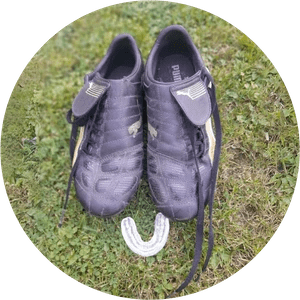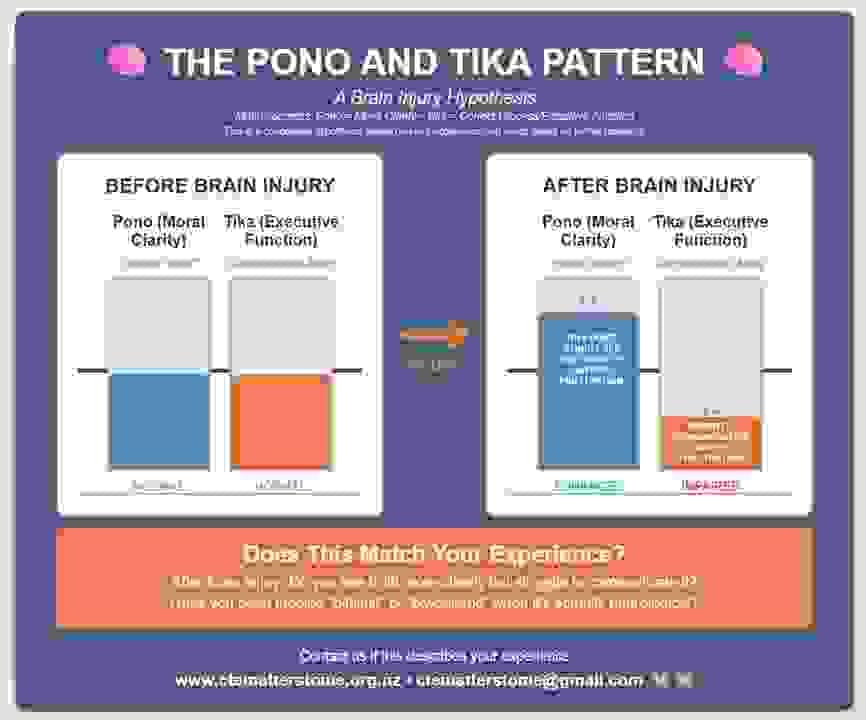

CTE Matters to Me
Welcome to our website. Our mission is to:
- raise awareness of CTE - chronic traumatic encephalopathy - in New Zealand
- present our hypothesis of 'The Pono and Tika Pattern' as distinct symptoms and markers of CTE, and invite feedback
- raise awareness of the devastating and tragic impacts of misdiagnosis
- reduce misdiagnosis of CTE through education of trainee doctors, nurses, the medical establishment, sporting organisations and the police
- provide sensible methods of helping people who have probable CTE
- provide mutual support, understanding and networking among people and families of those who have probable CTE
- develop a standard of care for people who have probable CTE
What is CTE?
- Chronic Traumatic Encephalopathy is a progressive neurodegenerative disease
- Caused by repetitive head impacts over time (not single incidents)
- Cannot be definitively diagnosed while living, but symptoms can be recognized
- Symptoms typically appear 8-10 years after head impact exposure
CTE Risk Factors:
- Contact sports (rugby, boxing, football, hockey)
- Military service with blast exposure
- History of domestic violence
- Multiple concussions or subconcussive impacts
- Any pattern of repetitive head trauma
We Remember
The late Shane Christie, New Zealand Rugby Player and truthseeker, with suspected CTE
The late Billy Guyton, New Zealand Rugby player with confirmed CTE
Introduction
Chronic traumatic encephalopathy (CTE)
Why I stopped watching football
A Selection of online resources about CTE
A New Avenue for Lithium: Intervention in Traumatic Brain Injury
Chronic Traumatic Encephalopathy: Update on Current Clinical Diagnosis and Management
Recent Preclinical Insights Into the Treatment of Chronic Traumatic Encephalopathy
Lithium treatment for chronic traumatic encephalopathy: A proposal
Recent Preclinical Insights Into the Treatment of Chronic Traumatic Encephalopathy
Lithium: A Novel Therapeutic Drug for Traumatic Brain Injury
A New Avenue for Lithium: Intervention in Traumatic Brain Injury
VA research on Traumatic Brain Injury (TBI)
Best Nootropics for Traumatic Brain Injury
Personal Stories from The Concussion Foundation
The Pono and Tika pattern
In our conversations about brain injury and CTE, Ange and I have noticed a common pattern, which is that people with brain injuries often experience two things at once:
1. enhanced moral clarity- i.e. seeing the truth and wondering why others can't see it too, which leads to intense frustration, and
2. impaired and inhibited communication, which also leads to intense frustration.
It seems to us that this combination of experiences leads to anger and grief (which is not the same as 'depression'). These issues are neurological, not psychological or 'psychiatric'.
Does this match your experience? If so, we'd love to hear from you.
The devastating consequences of misdiagnosis
Put yourself in the shoes of someone who has had repeated head knocks through sport and knows their difficulties are due to those injuries. They seek help, but doctors dismiss their head trauma history and instead diagnose them with "mental health" conditions like bipolar disorder.
This happens far too often. People with probable CTE face a medical system that doesn't understand brain injury symptoms and defaults to psychiatric diagnoses instead.
"The worst thing about probable CTE to me is not the disease, it's not being believed." - Ange Murtha
If this sounds like your experience, you're not alone. There are medical differences between CTE and psychiatric conditions, and you deserve proper evaluation.
About Us
We are two friends, Ange Murtha and Elisabeth Cave.
We believe that Ange has suspected CTE from her lifetime of sport, including rugby, in which she sufferered repeated concussions and head knocks; and accidents.
Ange's rugby shoes and mouthguard are shown in the logo. The name 'CTE Matters to Me' and the logo have been designed by Ange Murtha.
DISCLAIMER: We are not medical experts. This website is not offering medical advice. We are writing from experience and from our hundreds of hours of discussions about CTE. We see a desperate need for content which helps others understand CTE, to help enable deeply informed decision-making and avoid more tragedies.
Contact
Elisabeth 027 451 4081
Copyright CTE Matters to Me 2025

